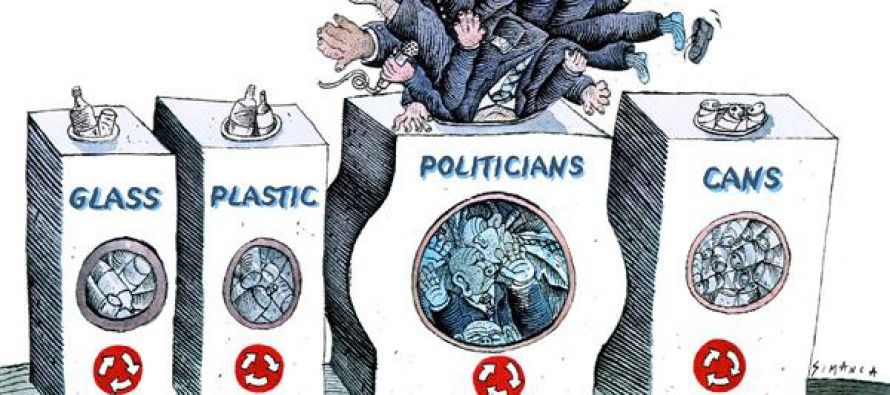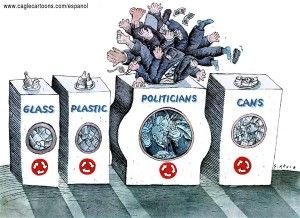Gov. Brown bans plastic bags

 Because Gov. Jerry Brown just signed SB270, in July 2016 plastic bags will be banned in stores in California. Paper bags will cost 10 cents. We’ve had a similar ban in Huntington Beach for a year and I look at it as yet another tax.
Because Gov. Jerry Brown just signed SB270, in July 2016 plastic bags will be banned in stores in California. Paper bags will cost 10 cents. We’ve had a similar ban in Huntington Beach for a year and I look at it as yet another tax.
At first, I remembered to keep and bring older paper bags. After a while, I thought that too tedious — just another annoyance government imposes on me. I need about one bag a day, so just asking for paper bags costs me about $36.50 a year. For a family of five, that would be $182.50 a year — a substantial sum for the poor and middle class.
The bill also mandates — excuse the governmentese, this is how they write and think:
“a reusable grocery bag sold by certain stores to a customer at the point of sale to be made by a certified reusable grocery bag producer and to meet specified requirements with regard to the bag’s durability, material, labeling, heavy metal content, and, with regard to reusable grocery bags made from plastic film on and after January 1, 2016, recycled material content.”
“Certified” means certified by a government bureaucrat. So it’s more employment for government employees and their unions — at our expense.
Novovirus
In Huntington Beach, I have to put up with shoppers ahead of in the checkout line fumbling to get their reusable bags ready, delaying the line and wasting my time. And ZDNet reported:
Recently, the Oregon Public Health Division released the information that an entire girl’s soccer team was infected with an outbreak of norovirus, a foodborne illness that causes severe symptoms including projectile vomiting and diarrhea. The source: a reusable grocery bag that they passed around and ate cookies from….
The Journal of Infectious Diseases says this represents the first verified occasion in which the virus was transported by an inanimate object, and that, “this also illustrates one of the less obvious hazards of reusable grocery bags.”
Dr. Charles Gerba, a professor in the Departments of Soil, Water and Environmental Science at the University of Arizona who conducts research about the transmission of pathogens through the environment, issued the following statement:
“The latest outbreak of norovirus reinforces the research we have conducted about the propensity of reusable grocery bags to act as hosts for dangerous foodborne bacteria and viruses. In reality, reusable bags are likely at fault much more often than we realize: cases often go unreported and uninvestigated.
“The cause of roughly 70 percent of foodborne illness cases, the norovirus spreads very easily and symptoms include projectile vomiting and severe diarrhea. It can have such sweeping consequences as school and emergency room closures. This incident should serve as a warning bell: permitting shoppers to bring unwashed reusable bags into grocery and retail stores not only poses a health risk to baggers but also to the next shoppers in the checkout line.”
Once again, government’s main function is to make our lives more miserable.
Sounds like another great reason to buy as much as possible online — preferably from another state.
Toxicity
And what about those evil plastic bags? Isn’t it worth risking getting hit with projectile vomiting to clean up the environment? After Los Angeles banned plastic bags in 2012, James Agresti of the Reason Foundation wrote:
In 2011, the United Kingdom’s Environment Agency released a study that evaluated nine categories of environmental impacts caused by different types of supermarket bags. The study found that paper bags have a worse effect on the environment than plastic bags in all nine impact categories, which include global warming potential, abiotic depletion, acidification, eutrophication, human toxicity, fresh water aquatic ecotoxicity, marine aquatic ecotoxicity, terrestrial ecotoxicity, and photochemical oxidation.
Furthermore, the study found that the average supermarket shopper would have to reuse the same cotton tote from 94 up to 1,899 times before it had less environmental impact than the disposable plastic bags needed to carry the same amount of groceries. This wide-varying amount of reuse that is required until the breakeven point is reached depends upon the type of environmental impact, but the median is 314 times, and it is more 179 times for all but one of the 9 impact categories.
For example, a shopper would need to reuse the same cotton tote 350 times before it caused less fresh water aquatic ecotoxicity than all of the plastic bags that it would replace over this period. Given the improbability that the same cotton tote would last that long (its expected life is 52 reuses), in most cases plastic bags will have less environmental impact.
So SB270 will make you sick and the environment more polluted. Typical California politics.
Related Articles
"Strange" Budget Process
Katy Grimes: Yesterday the Assembly passed a myriad of budget trailer bills. Sounds innocuous enough, right? Not according to Assemblyman
Ward Connerly defends equal opportunity
Nov. 16, 2012 By John Seiler One of my oldest sources in California is Ward Connerly, president of the American
Equal employment for criminals
April 30, 2012 By Katy Grimes A recent decision by the federal Equal Employment Opportunity Commission is about to undo many


